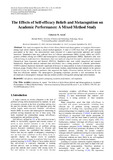The Effects of Self-efficacy Beliefs and Metacognition on Academic Performance
Abstract
This study investigated the effect of Self-efficacy Beliefs and Metacognition on Academic Performance
among high school students using a mixed method approach. A total of 2,138 form four (12th grade) students
participated in the study. The mixed-method study consisted of a quasi-experimental approach and in-depth
interviews. Quantitative data were collected from self efficacy questionnaire (SEQ), biology ability test (BAT),
genetics problem solving test (GPST) and metacognitive prompting questionnaire (MPQ). Qualitative data were
collected using in-depth interviews. Quantitative data were analysed using both descriptive and inferential statistics
(hierarchical linear regression and factorial ANOVA). Qualitative data were coded, categorized and reported
thematically. Regression analysis indicated that self-efficacy was a strong predictor of academic performance.
ANOVA analysis displayed statistically significant differences in metacognition in form of metacognitive prompts
between groups. Gender effects were also noted with female students outperforming male students on the genetics
problem solving test. Subsequent qualitative data suggested that highly efficacious students did better on the tests
than less efficacious students. The metacognitive prompting experience provides a rich environment for the
development of metacognitive strategies that can promote problem solving skills among high school students.
Collections
- Journal Articles [411]

